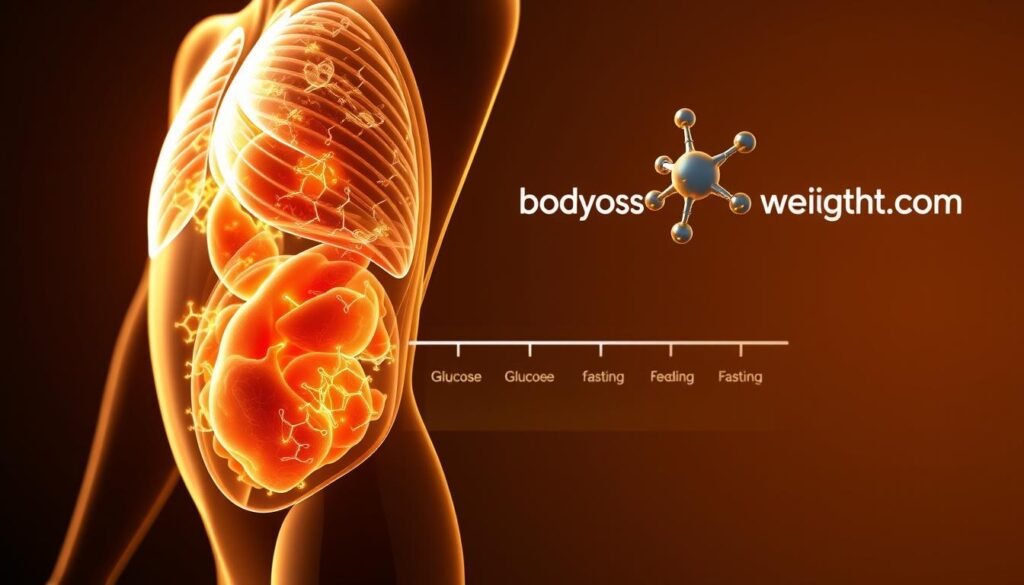Imagine coming home after a long day, feeling tired and hungry. You see takeaway menus in your kitchen. Then, you remember your friend talking about intermittent fasting.
They said it changed how they eat. It’s not about strict diets but when you eat. This easy way is popular for health benefits like losing weight and better health.
Now, you’re curious about intermittent fasting. This guide will tell you everything you need to know. It includes methods, health benefits, and how to start.
If you want to try intermittent fasting, keep reading. It might fit well into your life. For more info, check this comprehensive guide.
Key Takeaways
- Intermittent fasting focuses on when to eat, rather than what to eat.
- Popular methods include the 16/8 method and the 5:2 diet.
- Intermittent fasting has been linked to various health benefits, including weight loss.
- It can promote better metabolic health and cellular repair.
- Caution is advised for those with medical conditions or specific dietary needs.
- Getting started is straightforward, often beginning with small changes.
What is Intermittent Fasting?
Intermittent fasting means eating in cycles. You eat for some time and then don’t eat for others. It’s not about what you eat but when. This way of eating has been around since humans first existed.
Many cultures and religions have fasted for centuries. This shows how important fasting is to people all over the world.
Definition and History
Intermittent fasting means you eat and then don’t eat in cycles. It’s based on how humans used to eat when food was scarce. Fasting has always been tied to spiritual and religious practices.
This shows how deep fasting is in human tradition.
Why It’s Gained Popularity
Intermittent fasting is getting more popular. Health and fitness groups have helped spread the word. People are seeing benefits like losing weight and feeling smarter.
Social media and blogs share success stories and research. This makes more people want to try it for better health.
Intermittent Fasting Methods
Looking into different ways to fast can help you find what works best for you. Each method has its own benefits and ways to manage when you eat.
The 16/8 Method
The 16/8 method is very popular. You fast for 16 hours and eat for 8 hours. It fits well with the day, letting you eat at lunch and dinner.
Eat-Stop-Eat
Eat-Stop-Eat means fasting for 24 hours, once or twice a week. You stop eating after dinner and start again the next day at dinner. It’s good for losing weight and health, but it takes discipline.
The 5:2 Diet
The 5:2 diet is flexible. You eat normally for five days and eat only 500-600 calories on two days. It lets you enjoy meals while losing weight and improving health.
Alternate-Day Fasting
Alternate-day fasting lets you eat normally every other day. You eat less on fasting days. It’s flexible and works for many, making it easy to add fasting to your life.
Intermittent Fasting Schedule Options
Choosing the right fasting schedule is key to success. There are many options to pick from. It’s important to find one that fits your life and likes.
You can try daily time-restricted eating or flexible weekly or biweekly plans. Each has its own good points and challenges.
Daily Time-Restricted Eating
Daily time-restricted eating is a favorite. It means fasting for 16 hours and eating in an 8-hour window. Many find it easy and works well in their daily life.
For example, eating from noon to 8 PM is a common choice. It helps you stick to a routine and eat better.
Weekly and Biweekly Fasting Plans
Weekly and biweekly plans are great for those who find daily fasting hard. They let you set your own fasting schedule based on your energy and schedule.
You might fast on some days and eat on others. This makes fasting easier, especially when you’re just starting.
How Does Intermittent Fasting Work?
Intermittent fasting changes your body in big ways. It helps you lose fat and get healthier. It does this by changing how your body works and your hormones.
Metabolic Switching Explained
When you fast, your body starts a new way of working. It moves from using sugar to using fat for energy. This happens when it runs out of sugar.
This change helps your body use fat better. It can help you lose weight and stay healthy.
Hormonal Changes During Fasting
Fasting also changes your hormones. Your insulin levels go down, making it easier to use fat for energy. At the same time, your human growth hormone (HGH) goes up.
More HGH helps you lose fat and grow muscle. These changes make fasting a great way to stay healthy and fit.

Intermittent Fasting Benefits
Intermittent fasting is more than a trend. It brings many health benefits that can change your life. Knowing these benefits can encourage you to try it out.
Weight Loss and Fat Loss
One big benefit is losing weight and fat. It helps you eat fewer calories naturally. This way, you can lose pounds without strict diets.
Many people see a big drop in body fat. This makes them healthier and happier.
Improved Metabolic Health
Another great thing is better metabolic health. Studies show it can make your body handle sugar better. This helps with weight and lowers diabetes risk.
Enhanced Brain Function
Intermittent fasting is also good for your brain. Research finds it can make your brain work better. You might notice better focus, memory, and even live longer.
Intermittent Fasting Results
Starting an intermittent fasting journey can change how you see it. Many studies show it helps with weight loss and health. But, results can differ based on how well you stick to it and your lifestyle.
Expected Outcomes Over Time
People often lose weight while fasting. Studies say you might lose 0.8% to 13% of your body weight. Many feel more energetic and happier, especially when they fast.
These good feelings can make you want to keep going. It helps you stay on track and feel more motivated.
Studies and Research Findings
Research on fasting shows it can make your body healthier. It can improve how well your body uses insulin and lower blood pressure. But, most studies are small and short.
To really know how fasting works long-term, we need bigger and longer studies. This will give us clearer answers.
| Study Focus | Participants | Duration | Key Findings |
|---|---|---|---|
| Weight Loss | 120 | 3 months | Average weight loss of 10% |
| Insulin Sensitivity | 100 | 8 weeks | Significant improvements observed |
| Blood Pressure Reduction | 80 | 6 months | Average reduction of 5 mmHg |
Who Should Be Cautious with Intermittent Fasting?
Intermittent fasting has many benefits. But, it’s not for everyone. Some groups need to be careful with this eating method.
People with Medical Conditions
If you have serious health issues like diabetes or hormonal problems, be cautious. Fasting can change blood sugar and hormone levels. This might cause health problems. Always talk to a doctor before starting to fast.
Women Who Are Pregnant or Nursing
Pregnant or nursing women should be careful with fasting. Your body needs lots of nutrients during these times. Fasting could harm you and your baby. Always check with a doctor before fasting.
Intermittent Fasting Meal Plan Suggestions
Creating a good intermittent fasting meal plan can really help your health. Eating a variety of healthy foods during your eating time is key. This way, you get all the nutrients you need while following your fasting plan.
Try to eat foods that are full of nutrients. These foods should make you feel full and give you lots of energy.
Healthy Foods to Consume
When making your meal plan, choose foods that are good for you. Here are some foods to think about:
- Lean Proteins: Chicken, turkey, fish, tofu, and legumes.
- Whole Grains: Brown rice, quinoa, oats, and whole-grain bread.
- Fruits: Berries, apples, bananas, and citrus fruits.
- Vegetables: Spinach, kale, broccoli, and bell peppers.
- Healthy Fats: Avocado, nuts, seeds, and olive oil.
A Sample Day of Eating
Here’s a simple example of what a day of eating might look like:
| Meal | Foods | Nutrients |
|---|---|---|
| Breakfast | Oatmeal topped with berries and a drizzle of honey | Fiber, antioxidants, and healthy carbs |
| Lunch | Grilled chicken salad with mixed greens and vinaigrette | Lean protein, vitamins, and healthy fats |
| Snack | Sliced apple with almond butter | Healthy fats, fiber, and protein |
| Dinner | Quinoa with roasted vegetables and chickpeas | Plant-based protein, complex carbs, and micronutrients |
This example shows how to balance your meals. It helps you eat healthy foods and gives your body what it needs.

Safety and Side Effects of Intermittent Fasting
Before starting any fasting, it’s important to know about intermittent fasting safety. Many people find it helpful, but some might feel side effects at first. Knowing about these can make your fasting easier.
Common Side Effects
When you start fasting, you might feel a few things. These include:
- Hunger – You might feel hungry as your body gets used to not eating.
- Fatigue – You might feel tired, especially in the first days.
- Irritability – Mood swings can happen as your body adjusts.
- Weakness – Some people feel weak or tired.
- Reduced Cognitive Performance – Your focus might not be as sharp at first.
Some people, especially those with health issues or who are underweight, should think carefully about fasting. Watching how your body reacts and staying hydrated is key. If side effects are bad, talk to a doctor.
Getting Started with Intermittent Fasting
Starting intermittent fasting can seem hard, but it’s not. Making a few smart choices can help. Try the 16/8 method first. It lets you eat for 8 hours and fast for 16 hours.
Here are some tips for beginners:
- Start Gradually: Adjust your fasting times slowly to prevent shock to your system.
- Choose Your Window: Select an eating window that aligns with your daily routine and social life.
- Stay Hydrated: Drink plenty of water or calorie-free beverages to curb hunger.
- Listen to Your Body: Pay attention to hunger signals and avoid pushing yourself too hard.
- Focus on Nutrition: Prioritize whole, nutrient-dense foods during your eating periods to support overall health.
Conclusion
Looking back, intermittent fasting can really change how you eat and feel. It might help you lose weight and feel better mentally. But, how it works for you depends on your health and life.
When thinking about trying intermittent fasting, listen to your body. This way, you can find a balance that makes you feel good. If you need help, talking to a doctor is a good idea.
Intermittent fasting can be a great way to live healthier. It can make you feel better in many ways. With the right attitude and support, you can make it work for you.
FAQ
What is intermittent fasting?
It’s a way to eat by not eating all the time. You focus on when you eat, not what.
What are the benefits of intermittent fasting?
It might help you lose weight and improve your health. It can also make your brain work better and help with insulin.
What are the different methods of intermittent fasting?
There are many ways to do it. The 16/8 method, Eat-Stop-Eat, the 5:2 diet, and alternate-day fasting are some. They fit different lifestyles.
How does intermittent fasting aid in weight loss?
It helps you eat less without feeling like you’re missing out. This makes your body burn fat better.
Is intermittent fasting suitable for everyone?
No, it’s not for everyone. People with certain health issues, pregnant women, and those with eating disorders should be careful.
What should I include in my intermittent fasting meal plan?
Eat foods that are good for you. Include lean proteins, whole grains, fruits, veggies, and healthy fats. This helps you stay healthy during your eating times.
What are some common side effects of intermittent fasting?
You might feel hungry, tired, grumpy, and not as sharp. These feelings usually go away as you get used to it.
How can beginners start with intermittent fasting?
Start with the 16/8 method. Adjust your fasting times as you get better. Find an eating window that works for you.
What kind of results can I expect from intermittent fasting?
Results can vary. But, studies show you might lose 0.8% to 13% of your body weight. You might also see better health markers.
